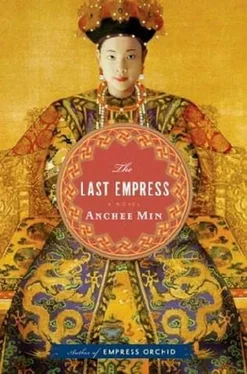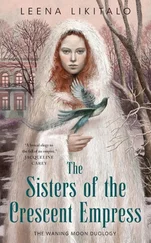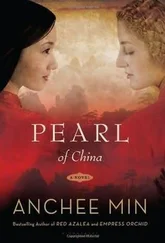I would have liked to ask him so many questions, but I did not know where to begin. Since there were other officials and ministers present, I could not simply speak my mind; I had to be careful what I said to a foreigner. I began with the royal formula and asked about his journey-the time of his departure, how long it took for him to reach Peking. I asked if his trip was a smooth one and if the weather had been fair. I also asked if he had been well fed and if he had slept soundly.
Our twenty minutes was nearly over and I felt that I barely knew my friend. He told me that he had a residence in Peking, but he was hardly home because his work required constant travel.
After tea, I asked him to move three feet closer-both to honor my guest and so I could make out the details of his face.
The man had gentle but penetrating eyes. I found it humorous because he appeared eager to get a good look at me as well. Our eyes met and we both smiled and were a little embarrassed. I said that I could not thank him enough for what he had done for the throne. I told him that he had first been recommended by Prince Kung, then by Li Hung-chang.
"I admire your dedication," I said. "You have been working for China for forty-one years, haven't you?"
Sir Robert was moved that I remembered his years of service.
"You have a Ningpo accent." I smiled. "Have you ever lived in southern China? I am from Wuhu, in Anhwei province, which is not far from Ningpo."
"Your Majesty is very perceptive. I landed in Ningpo when I first came to China. I was twenty-five years old and was a student translator. I haven't been able to rid myself of my backward ways."
"I love your accent, Sir Robert," I said. "Don't you ever correct it."
"One always tries to escape one's past, but one never can," he said.
Then our time was up.
On April 11, 1903, I was shattered by the news: Yung Lu had died. Guang-hsu and I were preparing a motion for a parliamentary government when word came. I felt that my insides were collapsing and had to ask my son to finish reviewing the documents. Li Lien-ying escorted me to a side room where I could have a moment to myself. I became dizzy and fainted. Li Lien-ying called for a doctor. Guang-hsu was scared. He came to my palace and stayed with me through the night.
In a way, Yung Lu had been preparing me for his death for months. He had worked tirelessly with the reluctant Emperor, trying to smooth over his relationship with Yuan Shih-kai. Both conservatives and radicals were using terror as a means to get their way. It was hard to control the situation without Li Hung-chang.
Doctors attended Yung Lu during our meetings in the Forbidden City. In order to introduce Guang-hsu and me to the men he trusted, Yung Lu came to audiences every day, and the last few days he arrived on a stretcher. No matter how ill he was, he always wore his official robe with the starched white collar.
Together we received S. S. Huan, the "money man" Li Hung-chang had recommended and whose relationship with Yuan Shih-kai had recently grown sensitive. Huan proposed that Yuan's responsibilities be expanded to include those of the commissioner of trade, suggesting there was disharmony between the two. Yung Lu and I had understood Huan's fear of Yuan Shih-kai, whose police were rumored to be responsible for the disappearance of a number of his powerful rivals.
In his sickbed, Yung Lu had talked with both Yuan Shih-kai and S. S. Huan. The two men promised to embrace harmony and let go of their differences.
Two days later, Willow notified me of her husband's collapse. Ignoring etiquette, I went to Yung Lu's residence in a palanquin to see him for the last time.
He was weak and thin, his skin paler than the cotton sheet beneath him. His body lay straight and flat, with both hands by his thighs. He had had a stroke and could no longer speak. His eyes were wide and his pupils were dilated.
Willow thanked me for coming and then excused herself. I sat by Yung Lu and tried to keep my composure.
He was in his eternal robe. Beneath his ceremonial hat, his hair was oiled and colored lacquer-black.
I reached out and touched his face. It was hard not to cry, and I forced myself to smile. "You are about to go on a hunting trip, and I will join you. I will prepare the bows and you will do the shooting. I'd like you to bring me a wild duck, a rabbit and a deer. Maybe not a deer but a wild pig. I will build a fire and roast it. We will have sweet yam wine and we will talk…"
His eyes became moist.
"But we will not talk about the Boxers or legations, of course. Only our good times together. We will talk about our friends Prince Kung and Li Hung-chang. I will tell you how much I missed you when you went to Sinkiang. You owe me a good seven years. You already know this, but I am going to tell you anyway: I am a happy woman when I am with you."
Tears slowly fell from the corners of his eyes.
My astrologer suggested that I dress like the Kuan-yin Buddha to invite good spirits. Li Lien-ying told me I looked so weary that his labors over my hair and makeup no longer helped. Devastated by Yung Lu's passing, I asked myself: Why bother to go on? If Li Hung-chang's death had shaken me, Yung Lu's swept my legs out from under me. I no longer wanted to get out of the bed each morning. I felt dead inside.
On my seventieth birthday the royal photographer was sent to take a picture of me. I had no desire to be seen, but the court convinced me that there should be a record of how I looked. European kings and queens posed throughout their lives, and even on their deathbeds, I was told. In any case, I finally agreed; perhaps I was attracted by the idea that this would be my final image.
When the costumes and props arrived, Li Lien-ying was conveniently assigned to stand in as the Buddha's servant boy. A couple of my ladies in waiting were asked to take the role of fairies.
The photographing took several afternoons. After I left an audience, I would pose on a boat by Kun Ming Lake or in my receiving room, which was transformed into an opera stage. Against a backdrop of mountains, rivers and forests, I concentrated on looking my part while my mind dealt with the troubles at court. I had conducted both Li Hung-chang's and Yung Lu's funerals and was burdened by the guilt that I had worked both men to death. Li Lien-ying stood next to me holding a lotus flower. When the photographer told him to relax, the eunuch broke down and sobbed. When I asked why, he replied, "The parliament has called for the abolition of the eunuch system. What do I tell the parents whose boys have just been castrated?"
The photographer asked if I wanted to look behind his camera. I wished that the upside-down ghostly image I saw there might bring me closer to the world where Li Hung-chang and Yung Lu had gone.
A few weeks later the finished pictures were presented to me. I was shocked by my own likeness. There was no trace of the beautiful Orchid in them. My eyes had shrunk and my skin sagged. The lines on both sides of my mouth were hard, as in a crude woodcarving.
"You must go on," the astrologer encouraged. "A picture of Your Majesty sitting on a boat floating among acres of lotus symbolizes your leading the people as they rise above the water of suffering."
Yesterday, five members of the new parliament whom I had granted permission to study governments abroad were killed by explosives. The news shocked the nation. The murders were plotted by Sun Yat-sen, who had been living in Japan and spreading his message that the Manchu government would fall by violence.
I spoke at the memorial service for the five men. "Sun Yat-sen means to stop me. He does not want China to establish a parliament. I am here to tell him that I am more motivated than ever before."
Читать дальше












